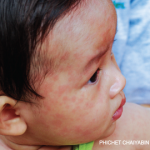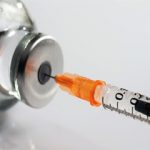 Despite the presence of a highly effective vaccine, measles (rubeola) is still an important problem worldwide, one that has reemerged in some areas of the world where it had previously been almost eradicated. Rheumatology patients may have questions about whether they are sufficiently protected. Here we discuss key considerations for rheumatologists in light of recent outbreaks.
Despite the presence of a highly effective vaccine, measles (rubeola) is still an important problem worldwide, one that has reemerged in some areas of the world where it had previously been almost eradicated. Rheumatology patients may have questions about whether they are sufficiently protected. Here we discuss key considerations for rheumatologists in light of recent outbreaks.
Background
Cassandra Calabrese, DO, trained as a rheumatologist and infectious disease specialist and is affiliated with the Cleveland Clinic. She points out, “The virus can sit in the air in the room where an infected person was and infect people for the next couple of hours. If someone with measles were to walk into a room of 100 unvaccinated people, at least 90 people in that room would get measles.”
Because it is so contagious, measles spreads very quickly through unvaccinated populations. Although many people experience no long-lasting problems from the infection, the disease can cause serious complications, including blindness, encephalitis and severe respiratory infections.1
Recent Measles Outbreaks
Although the trend since the turn of the century has been toward decreased numbers of measles infections, the past few years have seen increased rates worldwide. Almost all parts of the world are showing such increases, with substantial outbreaks in certain countries, including Madagascar, Sudan, Ethiopia, Georgia, Ukraine, Myanmar, the Philippines and Thailand, among others.2
Outbreaks have also been seen in countries with high vaccination rates overall, including the U.S. “Unfortunately, we’ve seen a steady upsurge in the number of measles cases, which for 2019 has exceeded the number of cases we have seen yearly since 1994,” explains Dr. Calabrese. “We’ve had two very large outbreaks in Washington state, which fortunately have been declared over, and other large outbreaks in New York state and New York City. These have been driven both by people coming in from other countries with measles as well as infections in unvaccinated populations that live in the U.S.” In the first seven months of 2019, the Centers for Disease Control & Prevention (CDC) confirmed 1,172 individual cases of measles in 30 U.S. states.3
Kevin Winthrop, MD, MPH, a professor of public health and infectious diseases at Oregon Health and Science University, Portland, says, “When you start dipping below levels of what you need in terms of population vaccine coverage, you put yourself at risk for the disease to reestablish itself.” He also notes, “To have this many endemic cases in the U.S. is quite a wake-up call.”


